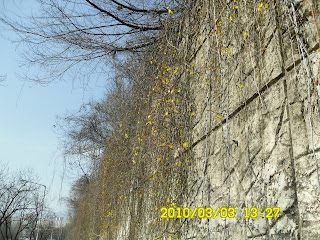In Korea, people call the sudden cold weather at the time when flowers bloom, “Kkosaem-Chuwi.”
“KKosaem” means to be jealous of flowers and “Chuwi” means coldness, or cold weather. So it means “Cold weather which is jealous of flowers.”
I saw yellow flowers began blooming on March 3, for the first time this year.

[The first flowers this year, この春最初の花、올해봄 처음으로 본 꽃]
The flowers are like “rengyo” in Japanese, or forsythia in English(a bush that has small bright yellow flowers in the early spring).
Just one week later (3/10), it snowed much so that the snow remained for a couple of days in Daejeon.

[Then it snowed a week later, 一週間後に雪が降った、일주일후에 눈이 내렸다]
That day, I went to ETRI to attend the Bible Class, so I carried my camera, and took several beautiful pictures with snow.

[Inside of ETRI、ETRI内の雪景色、ETRI내의 설경]
The next day (3/11) when I went to the college where I work, I also brought my camera and took pictures with the flowers and snow.
I thought it was the last snow this year, but alas, just one week later(3/17), it snowed again!

[The view from the college window, 大学の窓から見た大徳テクノバリーの雪景色 대학 창문으로부터 본 대덕 테크노 밸리의 설경]
I went to Mt. Gyeryong on March 19, the 3 days later, and I found the trail all covered with snow! (I wrote about his story on my hiking blog before.)
Now it will soon be in April. Every year about this season, I remember “Ohanami” party I enjoyed with KEC (Kamakura English Club).
Before coming to Korea, I kept attending this “Ohanami” party early April every year (maybe 30 times from 1974 to 2003.) We used to go to Genjiyama Park in Kamakura where you can enjoy viewing a lot of cherry blossoms at this time.
Sometime, we felt very cold even we could see cherry blossoms. We call such cold weather as “Hanabie” or “Flower-coldness.”
According to the Korean web dictionary, “KKosaem-Chuwi꽃샘추위” is “Hanabie 花冷え” in Japanese, and “the last cold snap” in English.
I like Korean expression because it impersonate the weather. Japanese expression simply explains the situation, and English expression sounds like it happens only once.
I feel nostalgic for “Ohanami” party with KEC members.
DR#179 「コッセムチュイ(꽃샘추위)」と「花冷え」
韓国では、早春、花が咲く頃の寒さを「コッセムチュイ(꽃샘추위)」」と呼ぶ。直訳すると「花を妬む寒さ」だ。
今年、私の住むテジョンで最初の花が咲いたのをみたのは3月3日だった。

[The first flowers this year, この春最初の花、올해봄 처음으로 본 꽃]
この花は、私が勤める大学へ行く道の片側の土手に上から垂れ下がっている枝に咲く黄色い花で、レンギョウに似ている。いわば『しだれレンギョウ』とでも言おうか。
ところが、この花が咲いてから1週間後、1日では融けないほどの雪が降った。

[Then it snowed a week later, 一週間後に雪が降った、일주일후에 눈이 내렸다]
この日はETRIで開催される聖書研究に参加する日だったので、カメラを持って出かけた。思いがけない冬景色をカメラに収めることができた。

[Inside of ETRI、ETRI内の雪景色、ETRI내의 설경]
その翌日は、学校へ出勤する日で、この『しだれレンギョウ』の上に積もった雪と、花のコントラストを写真に収めた。
もう雪は降るまいと思っていたら、さらに1週間後(3/17)、またしても雪が降った。

[Snow covered statue of the college-founder, 大学創始者の像にも雪、대학창시자의 동상에도 눈]
この週の金曜日、一人で鶏龍山へ登ったら、アイゼンが必要なほど雪が残っていておどろいた。
もうすでに3月も末で、あと二日すれば4月である。
私は日本で住んでいた時、毎年、この時期、英語会のお花見に参加した。その回数はおそらく30回。いつも鎌倉の源氏山公園へ行った。
年によっては雨が降って、会員の家の中でのお花見になった記憶もある。
日本では花見のころの寒さを「花冷え」という。
韓国語の辞書を引くと「コッセムチュイ」は日本語では「花冷え」英語では「the last cold snap」とある(Daum総合ウェブ辞書)。
韓国語では寒さを擬人化した表現だが、日本語では状況を説明している語感がある。また、英語では突然襲われたような不意打ちされたような感じ、そして最後の一回きりという感じがする。
日本のお花見がなつかしいこのごろである。
0 件のコメント:
コメントを投稿